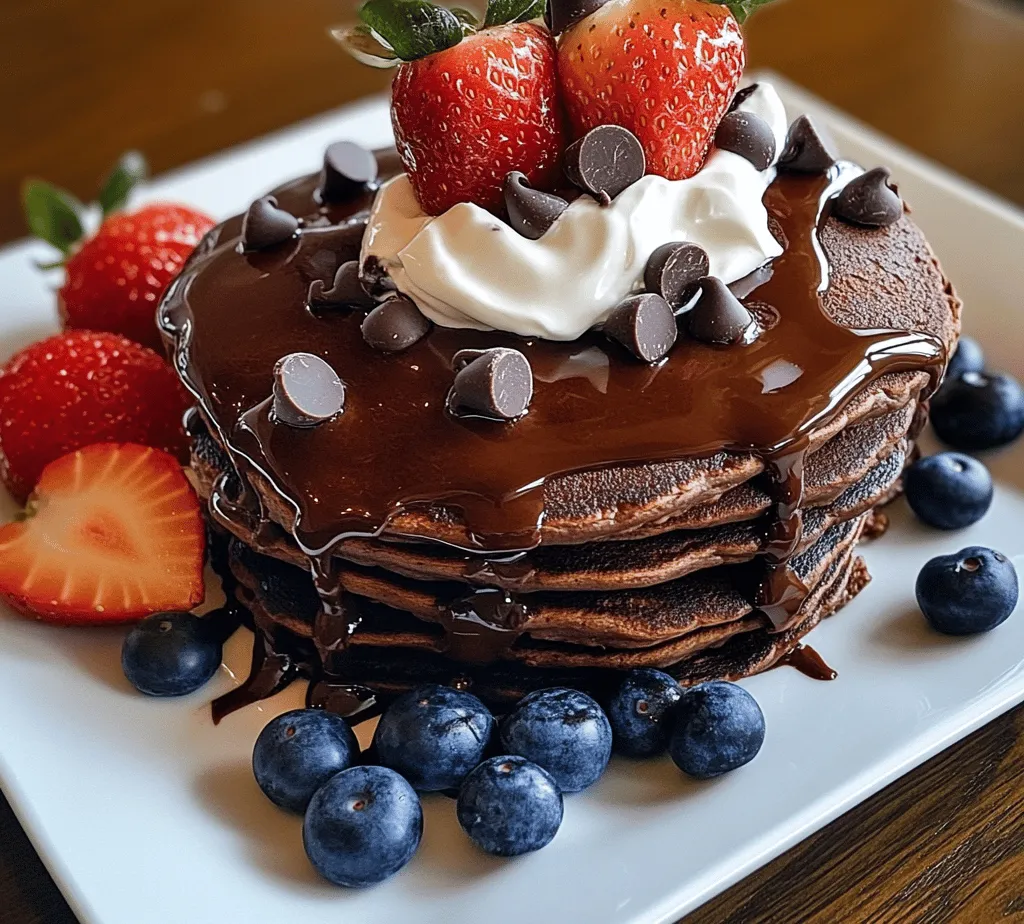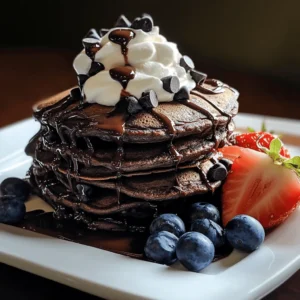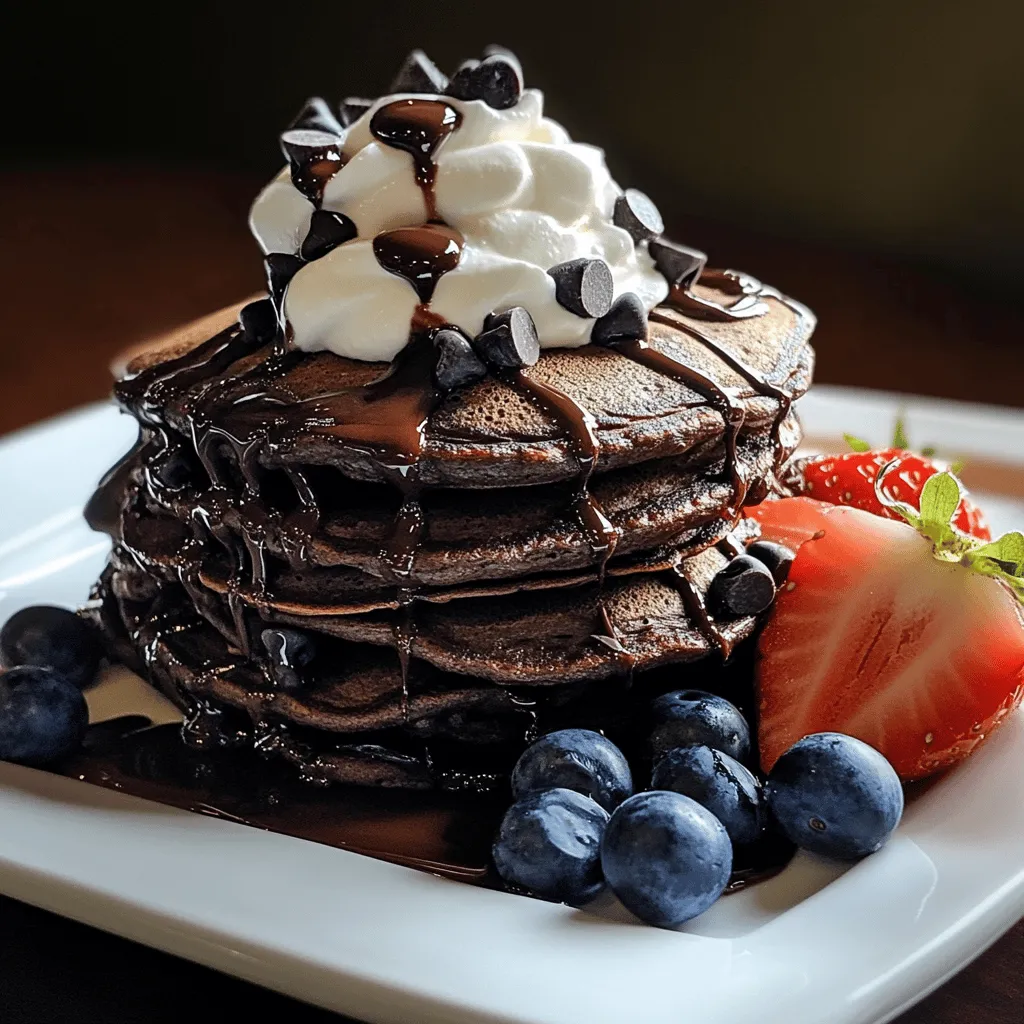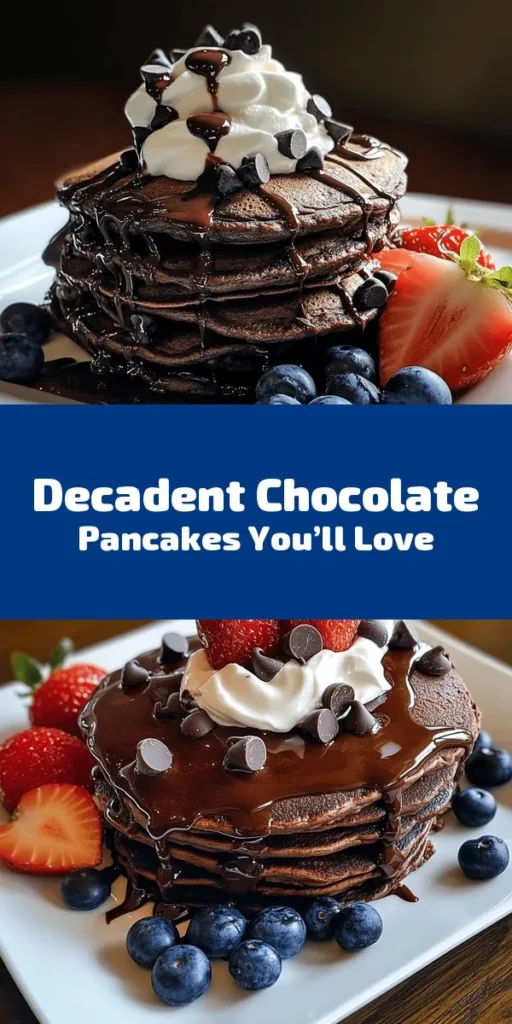Introduction
Delight in the rich, fluffy goodness of The Most Amazing Chocolate Pancakes, a perfect treat for breakfast or brunch that promises to satisfy your sweet tooth. This indulgent recipe combines the classic pancake with the irresistible flavor of chocolate, making it a favorite among both children and adults. The moment you take a bite, you will be enveloped in a wave of chocolatey goodness, complemented by the soft, fluffy texture that pancakes are known for. These pancakes are not just a breakfast item; they can serve as a delightful dessert, making them versatile enough for any occasion.
Imagine waking up on a lazy weekend morning, the aroma of chocolate wafting through the air as you prepare a stack of these decadent pancakes. The simple, yet satisfying process of making chocolate pancakes brings joy to the kitchen, creating moments of happiness that can be shared with family and friends. With straightforward instructions and everyday ingredients, you can whip up these delightful pancakes in no time, ensuring that your breakfast table is filled with deliciousness.
Let’s delve into the details of this mouthwatering recipe, exploring each component that goes into making The Most Amazing Chocolate Pancakes. Understanding the ingredients and their roles will help you achieve pancake perfection every time.
Understanding the Ingredients
Exploring Essential Components for Chocolate Pancakes
Getting the ingredients right is vital for making pancakes that are not only delicious but also have the perfect texture. Here’s a breakdown of each essential component that contributes to the ultimate chocolate pancake experience.
Overview of All-Purpose Flour and Its Role in Texture
All-purpose flour is the backbone of any pancake recipe. It provides the structure and body necessary to create fluffy pancakes. When you mix flour with liquids, gluten begins to develop, giving the pancakes their unique texture. Using the right amount of flour is crucial; too much can lead to dense pancakes, while too little won’t provide enough structure. For the best results, measure your flour accurately, preferably using the spoon-and-level method to avoid packing.
The Importance of Unsweetened Cocoa Powder for Flavor Depth
Unsweetened cocoa powder is the star ingredient that gives these pancakes their rich chocolate flavor. Unlike sweetened cocoa mixes, unsweetened cocoa allows you to control the sweetness of your pancakes. It also adds depth and complexity to the flavor profile, ensuring that each bite is chocolatey without being overwhelmingly sweet. Look for high-quality cocoa powder; the better the cocoa, the richer your pancakes will taste.
Granulated Sugar: Balancing Sweetness in Your Pancakes
Granulated sugar not only sweetens the pancakes but also plays a critical role in their texture. Sugar helps to retain moisture, creating a tender pancake. The amount of sugar can be adjusted based on your sweetness preference, but a good starting point is about two tablespoons. This amount strikes a balance between deliciously sweet and overly sugary, allowing the chocolate flavor to shine through.
Baking Powder and Baking Soda: Creating Fluffiness
Baking powder and baking soda are essential leavening agents that help the pancakes rise and become fluffy. Baking powder contains both an acid and a base, which react when mixed with wet ingredients, creating carbon dioxide bubbles that cause the batter to expand. Baking soda, on the other hand, requires an acidic ingredient (like buttermilk) to activate. Together, they create the light and airy texture that is characteristic of perfect pancakes. Be sure to use fresh leavening agents for optimal results.
The Function of Salt in Enhancing Flavor
Salt may seem like a small ingredient, but it plays a significant role in enhancing the overall flavor of your pancakes. It balances the sweetness and brings out the natural flavors of the other ingredients. Using a pinch of salt in your batter will ensure that your pancakes have a well-rounded taste.
The Role of Eggs in Binding and Texture
Eggs are crucial in pancake recipes as they act as a binding agent. They provide structure while also contributing to the moistness of the pancakes. The proteins in eggs help to create a tender crumb, while the fat in the yolk adds richness. For the best results, use room temperature eggs, as they mix more easily into the batter.
Choosing the Right Milk: Dairy vs. Non-Dairy Options
Milk is a key liquid ingredient in pancake batter, contributing to moisture and richness. You can choose between dairy milk or non-dairy alternatives, depending on your dietary preferences. Whole milk will yield richer pancakes, while low-fat and non-fat options will result in lighter pancakes. Non-dairy alternatives like almond milk, soy milk, or oat milk can also be used, but be mindful of the flavors they may impart.
Vegetable Oil vs. Melted Butter: Which is Better?
The choice between vegetable oil and melted butter can affect both the flavor and texture of your pancakes. Vegetable oil creates a lighter pancake, while melted butter adds a rich, buttery flavor. If you choose to use butter, make sure it is cooled slightly before mixing it into the batter to prevent cooking the eggs. You may also opt for a combination of both for the best of both worlds.
The Impact of Vanilla Extract on Overall Flavor
Vanilla extract is a simple yet impactful ingredient that elevates the flavor of your chocolate pancakes. It adds a warm, sweet aroma that complements the chocolate beautifully. Use pure vanilla extract for the best flavor; imitation vanilla can lack the depth and quality of the real thing.
Adding Semi-Sweet Chocolate Chips: A Sweet Surprise
For those who want to take their pancakes to the next level, adding semi-sweet chocolate chips can provide delightful bursts of chocolate in every bite. As the pancakes cook, the chocolate chips melt slightly, creating a gooey, chocolatey experience. You can adjust the amount based on your preference, but a half-cup is a great starting point for a decadent treat.
Step-by-Step Instructions for Perfect Chocolate Pancakes
Now that we have explored the essential ingredients, it’s time to dive into the detailed guide for crafting your chocolate pancakes. Following these step-by-step instructions will ensure that you achieve pancake perfection.
Mixing Dry Ingredients: Techniques for Sifting and Combining
Start by gathering all your dry ingredients in a large mixing bowl. This includes the all-purpose flour, cocoa powder, granulated sugar, baking powder, baking soda, and salt. To ensure a light and airy texture, it’s recommended to sift the dry ingredients together. Sifting helps to break up any clumps of cocoa powder and flour, resulting in a smoother batter. Once sifted, gently whisk the ingredients together to combine them evenly.
Whisking Wet Ingredients: Achieving the Right Consistency
In a separate bowl, you’ll want to combine your wet ingredients: eggs, milk, vegetable oil (or melted butter), and vanilla extract. Whisk these ingredients together until fully blended. The eggs should be broken up, and the mixture should have a uniform consistency. If you’re using buttermilk instead of regular milk, the acidity will react with the baking soda, adding to the fluffiness of your pancakes. Make sure the wet ingredients are at room temperature, as this helps them incorporate better into the dry mixture.
Combining Mixtures: Tips for Avoiding Overmixing
Once your dry and wet ingredients are prepared, it’s time to combine them. Pour the wet mixture into the bowl of dry ingredients and gently fold them together using a spatula or wooden spoon. Be careful not to overmix; some lumps in the batter are perfectly fine. Overmixing can lead to tough pancakes due to gluten development. A few gentle strokes should suffice to bring the batter together.
Preheating Your Pan: Optimal Temperature for Cooking
Before you start cooking, preheat your pan or griddle to medium heat. A properly heated surface is crucial for achieving golden-brown pancakes with a fluffy interior. To test if your pan is ready, sprinkle a few drops of water on the surface. If they sizzle and evaporate quickly, the pan is hot enough. If you’re using a non-stick surface, you may not need to add oil or butter; however, a light coating can help prevent sticking and add flavor.
As you embark on your journey to make The Most Amazing Chocolate Pancakes, remember to enjoy the process. Each step is an opportunity to create something special that can bring joy to your breakfast table, making your mornings a little sweeter. Stay tuned for the next part of this recipe, where we will cover the cooking method and serving suggestions to elevate your pancake game further.

Cooking the Panccakes: Signs of Doneness to Watch For
When cooking the most amazing chocolate pancakes, timing and observation are key to achieving that perfect fluffy texture. Here are the signs of doneness to watch for:
1. Bubbles Forming: As the pancakes cook, small bubbles will begin to form on the surface. This is one of the first indicators that the pancakes are ready to be flipped. When you see bubbles that have popped and left small holes, it’s time to turn them over.
2. Edges Firming Up: The edges of the pancake will start to look set and less glossy. If the edges appear to be firming up and the top is no longer shiny, it’s a good sign that your pancake is ready for a flip.
3. Golden Brown Color: Once flipped, the pancake should cook for about one to two minutes until it reaches a golden brown color. If the pancake is still pale after this time, leave it on the heat for a bit longer.
4. Springy Texture: After cooking both sides, gently press the center of the pancake with your finger. It should spring back slightly. If it feels too soft or gooey, it may need a little more time to cook.
Cooking pancakes is as much about feel as it is about time, so don’t be afraid to check your pancakes as they cook. This will help you develop a knack for knowing when they’re done.
Serving Suggestions: Creative Topping Ideas
The beauty of chocolate pancakes lies not only in their taste but also in their versatility when it comes to toppings. Here are some creative ideas to elevate your pancake experience:
– Classic Maple Syrup: Drizzle warm maple syrup over your pancakes for a timeless combination that enhances the chocolate flavor.
– Fresh Berries: Top your pancakes with a medley of fresh berries such as strawberries, blueberries, or raspberries for a burst of freshness and color.
– Whipped Cream: A dollop of homemade whipped cream adds a light and airy texture, complementing the richness of chocolate pancakes perfectly.
– Peanut Butter or Nutella: For a decadent twist, spread a layer of peanut butter or Nutella on top. You can also drizzle it over the pancakes for an added layer of flavor.
– Chocolate Chips: Sprinkle extra chocolate chips on top while the pancakes are still warm for a melty, indulgent treat.
– Coconut Flakes: Add a sprinkle of toasted coconut flakes for a tropical flair. This adds another layer of flavor and a crunchy texture.
– Chopped Nuts: Almonds, pecans, or walnuts can enhance both the flavor and the texture of your chocolate pancakes.
– Banana Slices: Add fresh banana slices for a natural sweetness that pairs beautifully with chocolate.
– Caramel Sauce: For those who crave a little extra sweetness, a drizzle of caramel sauce can turn your pancakes into a dessert-like treat.
Nutritional Information
Understanding the health aspects of chocolate pancakes can help you enjoy them guilt-free. Here’s a breakdown of their nutritional content and ways to make healthier choices.
Breakdown of Nutritional Content per Serving
For a standard serving of chocolate pancakes (approximately two pancakes), the nutritional breakdown is as follows:
– Calories: 320
– Total Fat: 12g
– Saturated Fat: 6g
– Cholesterol: 70mg
– Sodium: 350mg
– Total Carbohydrates: 48g
– Dietary Fiber: 3g
– Sugars: 12g
– Protein: 7g
This information can vary depending on the specific ingredients and portions used, so always consider your adjustments when calculating the nutritional content.
The Balance of Carbohydrates, Proteins, and Fats
Chocolate pancakes provide a good balance of carbohydrates, proteins, and fats. The carbohydrates from the flour and sugar give you energy, while the protein from the eggs and milk helps keep you feeling full. The fats from butter and chocolate contribute to the richness and flavor of the pancakes.
However, if you’re looking to adjust this balance, consider the following:
– Increase Protein: Use protein-rich flour, such as chickpea flour or add a scoop of protein powder to your batter for an extra boost.
– Reduce Sugars: Substitute refined sugar with natural sweeteners like honey or maple syrup, or use mashed bananas for sweetness without the extra sugar.
Healthier Substitutions: Making it a Guilt-Free Treat
You don’t have to sacrifice health for taste. Here are some healthier substitutions to consider:
– Whole Wheat Flour: Swap regular flour for whole wheat flour to increase fiber content, which can aid digestion and keep you fuller longer.
– Almond Milk or Oat Milk: Use nut or oat milk instead of regular milk for a dairy-free and lower-calorie option.
– Greek Yogurt: Incorporate Greek yogurt into the batter for added protein, moisture, and creaminess without the extra calories.
– Cocoa Powder: Opt for unsweetened cocoa powder instead of chocolate syrup to reduce sugar while retaining chocolate flavor.
Allergens to Consider: Dairy, Gluten, and Nuts
When preparing chocolate pancakes, it’s essential to consider potential allergens. Common allergens include:
– Dairy: For those who are lactose intolerant or have dairy allergies, use dairy-free milk and yogurt alternatives.
– Gluten: For those with gluten sensitivities, consider gluten-free flour blends that can replace regular flour in the recipe.
– Nuts: If you’re using nuts as toppings or in the batter, be cautious about nut allergies. Always label the pancakes if serving to others.
Variations and Customizations
Exploring creative twists on the classic recipe can make your chocolate pancakes even more exciting. Here are some variations and customizations to try:
Vegan Chocolate Pancakes: Ingredient Swaps for Plant-Based Diets
To make your chocolate pancakes vegan, swap the following ingredients:
– Eggs: Replace eggs with flaxseed meal mixed with water (1 tbsp flaxseed meal + 2.5 tbsp water = 1 egg) or use applesauce.
– Milk: Utilize almond milk, soy milk, or any other plant-based milk for a creamy texture.
– Butter: Substitute with coconut oil or a vegan butter alternative.
These substitutions will maintain the fluffy texture and rich chocolate flavor while catering to a plant-based diet.
Gluten-Free Options: Flour Alternatives for Every Diet
For gluten-free chocolate pancakes, consider these flour alternatives:
– Almond Flour: Provides a nutty flavor and a rich texture but may require additional binding agents like xanthan gum.
– Coconut Flour: Highly absorbent, so use less coconut flour than you would regular flour and increase the liquid in the recipe.
– Oat Flour: Ground oats make a great substitute and add a mild flavor that complements chocolate.
Flavor Enhancements: Adding Spices or Extracts
Elevate your chocolate pancakes by incorporating:
– Vanilla Extract: A splash of vanilla extract enhances the overall flavor profile.
– Cinnamon: Add a pinch of cinnamon for warmth and depth.
– Espresso Powder: A teaspoon of espresso powder will intensify the chocolate flavor without making them taste like coffee.
Different Mix-Ins: Nuts, Fruits, and More to Elevate Your Pancakes
Take your chocolate pancakes to the next level by adding:
– Chopped Nuts: Walnuts, pecans, or hazelnuts for crunch and added nutrition.
– Fresh Fruits: Chopped strawberries or banana slices can add a fresh burst of flavor.
– Chocolate Chips: Sprinkle chocolate chips in the batter for an even more indulgent experience.
Pairing Suggestions
To create a full breakfast experience, consider pairing your chocolate pancakes with complementary options:
Best Beverages to Serve: Coffee, Tea, and Smoothies
– Coffee: The rich flavor of coffee complements chocolate perfectly. A cup of freshly brewed coffee or a mocha latte would be an excellent choice.
– Tea: Herbal teas, such as peppermint or chai, can provide a soothing contrast to the sweetness of the pancakes.
– Smoothies: A berry smoothie or a green smoothie can add a refreshing touch and balance the richness of the pancakes.
Complementary Breakfast Foods: Sides to Consider
Enhance your breakfast spread with these sides:
– Eggs: A sunny-side-up or scrambled egg can add a savory element to your meal.
– Bacon or Sausages: The saltiness and protein of bacon or sausage balance the sweetness of the pancakes.
– Yogurt: A side of Greek yogurt topped with honey or fruit can add creaminess and a nutritional boost.
Seasonal Toppings: Utilizing Fresh Ingredients Throughout the Year
Make the most of seasonal ingredients by topping your pancakes with:
– Spring: Fresh strawberries or rhubarb compote.
– Summer: Peaches or berry mixes.
– Fall: Caramelized apples or spiced pumpkin puree.
– Winter: Pomegranate seeds or citrus segments.
Conclusion
The Most Amazing Chocolate Pancakes are not just a breakfast item; they are an experience that brings joy to the table. With their rich chocolate flavor and fluffy texture, these pancakes offer a delightful way to start your day or to enjoy as a special treat. By following the steps outlined, you can master this recipe and make it your own with various adjustments and toppings to suit your taste. Embrace the joy of cooking and the pleasure of sharing delicious meals with loved ones through this delightful pancake recipe.
With their versatility and rich taste, chocolate pancakes can easily become a family favorite. Whether you enjoy them traditionally or experiment with variations, the possibilities are endless. So gather your ingredients, fire up that griddle, and indulge in the most amazing chocolate pancakes today!



